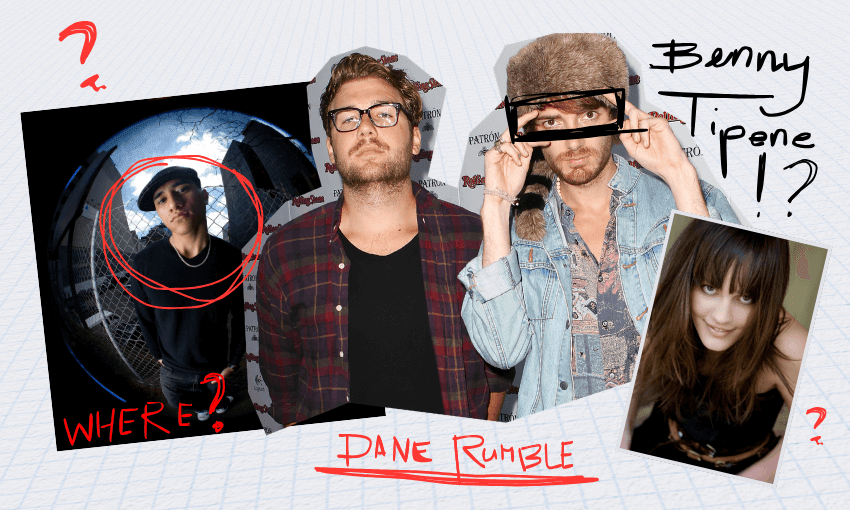Joel Little with Lorde, Dera Meelan with Church & AP, Josh Fountain with Maala and Randa and Benee – producers make good songs great. Now a new fund from NZ on Air is putting the focus on them.
Six months ago it looked like the music industry was on the brink of collapse. Independent venues nationwide were furiously crowdfunding to stay afloat. Spark Arena had been converted into an emergency response hub. New Zealand artists and technicians on international tours were sent home without jobs.
The government’s Covid-19 arts and culture recovery fund, announced in May last year, included $16.5 million funnelled toward the music industry. The intention was to prop up those left gutted by lockdowns and border closures. New Zealand on Air (NZOA) has taken the step of investing in a new future alongside preserving its past and present.
A portion of its recovery money has gone into the music development fund: 27 local producers were given grants of up to $6,000 so they could work with emerging artists.
The artists aren’t expected to be well known, because the aim is to fund work that may not be eligible for new music single funding. “The idea is to flow information and experience from Aotearoa’s many talented producers to exciting artists early on in their careers,” said NZOA spokesperson Ash Wallace.
“Each producer that is funded has selected an artist that they feel passionate about, and we trust that they have recognised something exciting about that talent.”
Each producer needs to work with an artist to produce at least three song demos. Hopefully some songs will be released, but it’s not a requirement. Of the producers chosen, many are artists in their own right – they’ve been chosen as producers so they can share their knowledge with up-and-comers.
“It’s important that the producer can show they are well established so that their experience can be meaningfully passed on to the artist,” said Wallace. “The demand for this fund has been really high, so we have had some extremely impressive producers come through which is really encouraging.”
One producer funded by the program is Auckland musician Lévyne, real name Sophie Bialostocki. She’s a trained classical pianist working as a producer and artist. In between lockdowns in Auckland, Lévyne has still managed to play shows, supporting the likes of Daffodils and Foley, as well as scoring a gig at Rhythm & Vines over the summer. She said the music development fund is a “pretty massive” opportunity.
“Lots of the other funding offered is for more established artists that have a track record which can be hard to reach for years when you’re starting off,” she said. “This is a great way of providing something in the middle for artists which isn’t so success-based. So long as new artists can find a good producer, this fund means there’s less anxiety around paying for their service. Music is so expensive and so hard when you’re investing in it all yourself, often people leave songs on the back-burner because production fees are too expensive.”
Another producer-slash-artist, Estère Dalton, who records as just Estère, said production is often the “unseen element” of a project. “Production gives things a unique aesthetic,” she said. “A song can sound so different depending on how it’s put together, and I think for emerging artists figuring out what they resonate most with, and what aesthetic to put into their music, is really important.”
A producer’s capabilities are often limited by money – they need equipment, studio time, and labour costs covered. “I’ve always worked within my means, and my means have often been limited,” said Estère. “I think the new music development funding will allow people to develop their skills more, because they’ll be able to afford more plug-ins and work with more artists.
Wallace said the producer talent in New Zealand is immense, and NZOA wants to incentivise producer-led initiatives. “I’ve noticed a distinct change in attitudes towards collaboration in New Zealand, with more and more people working together to achieve their wider goals,” she said.
“This fund does rely on producers and artists being open to collaboration and influence to create new and exciting demos. This fund has been possible with the additional government funding, but I think it’s also exciting timing that the industry is ready to embrace a concept so collaborative.”
Estère said some New Zealanders, like APRA SongHubs’ Greg Haver, are pushing for our country to become a global music hub. People like Josh Fountain and Jawsh685 are making friends and waves around the world.
“I feel like with globalisation and the internet, even though we’re a small country at the bottom of the world our potential and our access is constantly elevating,” said Estère. “And that could mean a lot of stuff continues to emerge from New Zealand and do well on an international stage.”
Estère will use her funding to work with a Wellington-based artist called Ivy Angel. “We’re going to use it to bring in session musicians, do a session in a recording studio, and hopefully come up with a couple of songs that she can do what she wants with.”
Lévyne is working with an artist rebranding from their old music. “This EP we’re making is really special and familial, and I can’t wait to spend the time in the studio finding ways to encapsulate that!”
Both producers feel the fund will change the way music is made and emerging artists are heard in New Zealand.
“I wish this was around a couple of years ago,” said Lévyne. “It would have been so instrumental to some of my friends and I. The support coming about for new producers, especially womxn, is so important I can’t even explain.
It will make a difference.”
This content was created with the support of NZ on Air. For more information about the New Music Development funding scheme, including eligibility details and 2021 application deadlines, click here.



